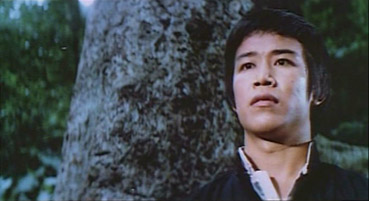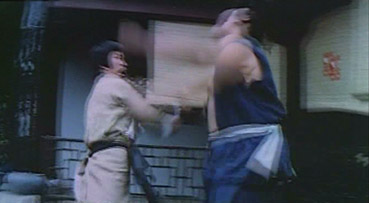|
An
eight-man gang known as the Eight Dragons attempts to steal
a treasure map from a government official, but when a simple
robbery ends up in the massacre of the entire household,
a rethink of the plan is required. Fearing the wrath
of the district police, the men agree to split the map into
eight sections (it's octagonal, which is handy), keep one piece each
and meet again in three years time to claim the treasure when
the heat has died down.
Three
years pass and one of the gang, who has been arrested on
a petty charge, escapes with the help of another prisoner
and meets up with one of his former partners in crime. Unbeknown to him, however,
his fellow escapee turns out to be undercover cop Fong-yi,
who has been working for some time with his partner to retrieve
all of the map pieces. When two of the gang members kill Fong-yi's criminal companion
(with a spade in the stomach – ouch), he violently
dispatches them and sets off to retrieve the remaining
segments of the map.
All
of which sets things up for series of kung-fu battles in
which Fong-yi goes up against a variety of opponents and
weapons, paving the way for the plot to take something of a back seat, which is unsurprisingly what it then does. Yet things do not always play out as expected. One
gang member, for example, fights to keep his segment not
out of greed, but to procure funds for his blind mother
and unwell son, and after beating him to bits, Fong-yi has
to visit the mother to tell her comforting stories and make
financial restitution for his actions, a sequence awash with the sort of jaw-dropping sentimentality that
Hong Kong cinema sometimes specialises in. Others that you would
expect to fight to the death end up begging for mercy and
are allowed to flee with their lives, and at one point Fong-yi
is captured by the remaining gang members and strapped to
a post, though given his preference for spectacular kicks,
you'd think someone would have had the foresight to tie his bloody legs up.

The
fights themselves are bit of a mixed bag. Fong-yi is played by
Tan Tao-liang, whose fancy legwork was responsible for his
nickname of 'Flash Legs' and the re-titling of this film
to the same from the far better Shaolin Deadly Kicks.
Liang's moves are certainly impressive in themselves, but
too many of the fight sequences are done in a style I have
started calling 'Rehearsal Kung-Fu', in which the opponents
run through a series of choreographed moves as if they are
warming up for the actual take, with no sense of any real
force being used or contact being made. Every now and again,
though, we get a taste of the real deal, usually in the
shape of swiftly delivered roundhouse kicks to the head.
Some fights are certainly a lot better than others, with a standout battle
occuring at a roadside and against swordstick-wielding
gang member Chu, and it's always good to see a female fighter
proving she can kick as hard as the boys.
Even
allowing for the leaps of credibility inherent to the kung-fu
genre, there's some serious swallowing to do here. When
Fong-yi is ambushed with bamboo spears, for example, he
convinces his assailants he has been killed by faking a
spectacular fatal injury, which suggests that he was somehow fully
prepared for just this eventuality and had a cache sawn-off
spears and fake blood stored behind a nearby rock. Real
spears probably wouldn't have killed him anyway –
he collects an astonishing assortment of vicious wounds
on his quest, from sword cuts to a poisoned knife in the
back and being gouged with a metal claw, but recovers from
each in no time at all with little more than a bandage and a change of clothes.
The
Flash Legs is a middling piece of old-school kung-fu
that occasionally rises to something better. Of definite
interest to genre fans, not least for the kicking skills
of Liang, but it's not one that most of us will be falling
over each other to get our hands on.
Three
letters come to mind when watching 55th Chamber's recent
DVD release of The Flash Legs, and they are V, H and
S. The non-anamorphic 16:9 picture is riddled with issues
and looks and sounds as though it has been hauled off of
a low band tape copy, and an NTSC one at that. Contrast
in particular is variable and shadow detail is always weak,
with black levels up and down depending on the shot but
never close to ideal. Dust spots are frequent and
sometimes numerous, on occasion accompanied by print damage.
Most edits are signified by a frame-long white line at the
top or bottom of the screen (sometimes both at once) and
there is an almost constant shimmer to the picture that
is particularly evident on areas of one colour (except black,
of course). The main title has clearly been added once the
print had been hauled onto the computer for mastering, and
the film does not so much end as come to a halt, a freeze frame followed
a couple of seconds later by the music cutting off mid-stream
and the visibly damaged film leaping briefly in
the gate.

Ignoring
the fact that only the original English dub is available
(and rough though it is, it's not as bad as some), the suspicion
of low band tape master is enhanced by auto record levels
that whack the background hiss and hum right up if there
is even a second of silence, only to drop it sharply when
someone speaks. Loud sounds are noticeably distorted.
The
55th Chamber usual bare minimum here consists of The
Flash Legs UK Promotional Trailer (1:28),
which looks as if it's been knocked up in an hour on a home
computer, an Image Gallery (0:58),
which is actually quite good if a little brief, and a promo
for some of the label's current releases.
Once
again, 55th Chamber have rescued a lost genre work from obscurity
but at a serious cost in terms of picture and sound quality.
Of course you can argue that at the very reasonable retail
price of under £6 you can't expect Hong Kong Legends
quality, but this is still way below par for DVD. If by
some chance you have it on tape then I'd stick with it – this is unlikely to be an improvement.
|